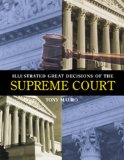 The landmark case is included in Illustrated Great Decisions of the Supreme Court by Tony Mauro (KF4549 .M334 2000) located in the Brooklyn Law School Library Main Collection. The BLS Library also has in its collection the print and video versions of Gideon’s Trumpet which tells the story behind the case which began in a Florida state court when the defendant Clarence Gideon was charged with a felony for breaking and entering.
The landmark case is included in Illustrated Great Decisions of the Supreme Court by Tony Mauro (KF4549 .M334 2000) located in the Brooklyn Law School Library Main Collection. The BLS Library also has in its collection the print and video versions of Gideon’s Trumpet which tells the story behind the case which began in a Florida state court when the defendant Clarence Gideon was charged with a felony for breaking and entering.
Marking the 50th Anniversary of the decision in March of this year, BLS Law Professor Susan Herman will be the keynote speaker at a two day seminar sponsored by the Florida Association of Criminal Defense Lawyers. The session, called Gideon v. Wainwright, March 18, 1963: A Day Worth Celebrating, will feature several other speakers including Assistant Federal Public Defender Paul Rashkind, Public Defender, Sixth Judicial Circuit Bob Dillinger, Stetson University College of Law Prof. Bruce Jacob, and others.



